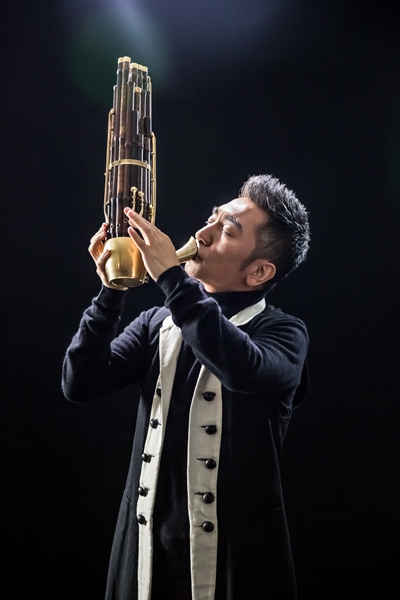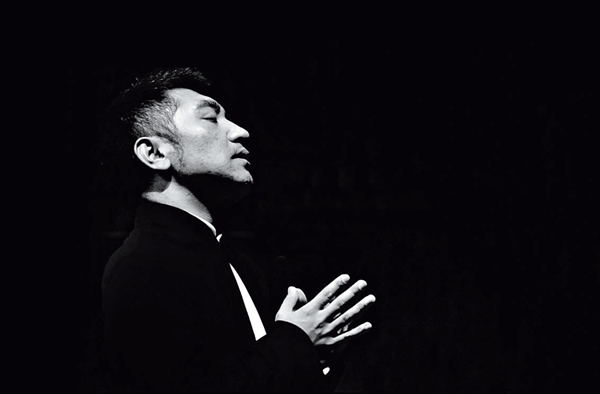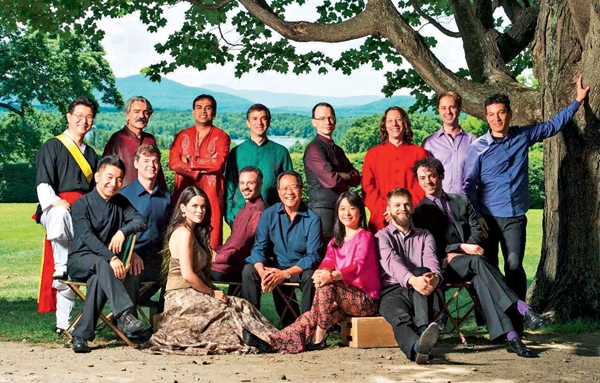Wu Tong and Silk Road Ensemble’s celebration of world music
- By staff reporter Zhang Hui
 0 Comment(s)
0 Comment(s) Print
Print E-mail China Today, June 22, 2017
E-mail China Today, June 22, 2017
Westerners in the 59th Grammy Awards audience wowed songstress Adele's five-trophy sweep and basked in Beyonce's epic performance of a five-song medley. Chinese music lovers, meanwhile, delighted in Wu Tong of the Silk Road Ensemble's Best World Music award for the album Sing Me Home. It was Wu's second Grammy.
"I'm happy, though not astonished, to get the award, because it means that more people will appreciate the distinct beauty and cultural inclusiveness of our music," Wu Tong told China Today. He added, "Over the past 18 years since it formed, the ensemble has set out to bridge different cultures with music, in hopes that it will help people of different nationalities and belief systems to respect and better understand one another. This, to me, is the true meaning of Best World Music."
|
Wu Tong, Chinese Sheng player and vocalist of the Silk Road Ensemble. |
When recalling the Grammy awarded to Yo-Yo Ma for his collaborative album in 2010 – the first ever shared by Chinese artists – Wu said, "That was a surprise. I did not expect Yo-Yo to include Happiness, a distinctly Chinese song based on the Chinese pentatonic scale, on Yo-Yo Ma & Friends: Songs of Joy and Peace. It won the Classical Crossover album award."
Eliminating Dissension
The past few years have seen a warm response from the international community to the China-proposed Belt and Road Initiative. The project tallies with the hopes of many countries for cooperation, exchanges, and development. As early as 1998, aware of the importance of musical exchanges and fusion, Yo-Yo Ma, inspired by the ancient cultures and traditions of countries along the ancient Silk Road, decided to start a band made up of composers and performers from all over the world. His aim, as stated on the band's website, was to "explore how the arts can advance global understanding."
Wu Tong summarized the ensemble's mission: "to eliminate dissension with music." As a founding member of the ensemble, Wu Tong was invited to join in 1999 after giving a lecture at the University of Michigan, and made a performance tour of the United States. Wu complemented his performance with an explanation of the history of the 16 traditional Chinese wind instruments that he played during the show.
|
Wu Tong, Chinese Sheng player and vocalist of the Silk Road Ensemble. |
Wu enacts the multiple roles in the ensemble of composer, vocalist, and player of several traditional Chinese music instruments.
"What we create is a kind of crossover music that blends diverse styles, from the traditional folk music of various countries to classical, modern and popular music. As well as playing instruments, we also sing, dance and play rap. We've never confined ourselves to any set style. Our ensemble has nurtured an open and free space where each musician freely expresses themselves. I instill Chinese elements into our music, including rock, traditional folk music, and even local opera," Wu said.
The ensemble's achievements, as might be expected, owe a lot to its founder and art director, Yo-Yo Ma. Ma has invited world-renowned musicians of various nationalities to create and adapt music for the ensemble. Wu revealed that Yo-Yo Ma donated the personal prize of US $500,000 he once received as an award to the Silk Road Fund. No one in the ensemble knew until a few years later.
"He is the most polite and considerate of all ensemble members. He is modest and kind to everybody. Once on stage, he presents with his cello diverse human facets, often with a passion that arouses people's inner zest for life, but sometimes creating an exquisite, delicate, heartrendingly tender ambience," Wu said. "He is also extremely diligent, and constantly hones his skills. I've never known him to be daunted by any musical challenge."
Yo-Yo Ma also does his utmost to create a free atmosphere in the ensemble where musicians can express their ideas. "He is a music maestro. He might be dogmatic, and nobody has a problem with that. But he always listens. During a meeting, he tends to keep quiet and give others a chance to say what's on their minds. This makes us feel valued and integral to the team. Both his devotion to music and composure when under pressure are admirable. Yo-Yo is a friend and mentor to me," Wu said.
|
The Silk Road Ensemble. |
When explaining the ensemble's approach to music creation, Wu said, "One composer is generally responsible for one piece of work, but sometimes two might work together. Sometimes a few work together on improvising a melody. There are diverse ways of creating works. If you are improvising, other members help by tuning in to your theme, or even creating crescendos that set off your performance."
A video titled, in Chinese, "Yo-Yo Ma intoxicated by the face-off performance of Chinese Sheng (a wind instrument) player Wu Tong and their Indian drummer" went viral online. Wu commented, "That was a perfect example of musical improvisation, and also trust."
The performance took place at a concert in Boston to commemorate the 15th anniversary of the founding of the ensemble. "When our show ended, the audience still wanted more, and demanded encores. But at that moment I didn't want to perform a traditional Sheng piece because I felt the urge to give the audience something new. So I improvised that melody on the Sheng. Inspired, our Indian drummer Sandeep Das joined in with an impromptu performance," Wu explained. It's rare in a performance of classical music for a player to join in unbidden, because they generally follow the music notation. "However, for us, musical ad libbing is welcome. We improvise a piece on stage, so teasing and taking the audience by surprise, and keeping each other on the hop."
The more people became familiar with the Silk Road Ensemble, the more fascinated they became with the unfamiliar, and sometimes unimaginable sounds it created. "Chinese and Indian folk music blends well. Traditional Iranian music also complements European classical music. We make these apparently impossible musical mixtures possible," Wu said.
As the ensemble constantly produces new albums and makes regular world tours, it wins more and more fans. Apart from being drawn to its unique music, people also sense the chance to communicate with different cultures on a level beyond their music. The Vancouver Sun described it as "one of the 21st century's great ensembles" and the Boston Globe as a "roving musical laboratory without walls."
The Grammy-winning album Sing Me Home features works by composers other than ensemble members, from many different countries and regions, including India, Central Asia, and Africa. "Different nations have different interpretations of home. The song Going Home that I sing from the album recreates a nostalgic melody from a symphonic piece by Dvorak. It interprets home as a haven for one's soul. Diversified interpretations of home make it possible for everyone to find common points of familiarity," Wu said.
Ma, recipient of 18 Grammys, wrote on his website: "Since the very beginning, the Silk Road Ensemble has been about departure and explorations, new encounters and homecomings. The music composed, arranged, and performed by ensemble members and our friends on Sing Me Home is a tribute to how culture helps us all to meet, connect, and create something new."
"Apart from being an expression of approval for our efforts over the past 18 years, I think the Grammy might also have implied the award panel's mindset amid the intensified globalization which is still punctuated by backlashes and instances of cultural estrangement among certain nations," Wu said.









Go to Forum >>0 Comment(s)